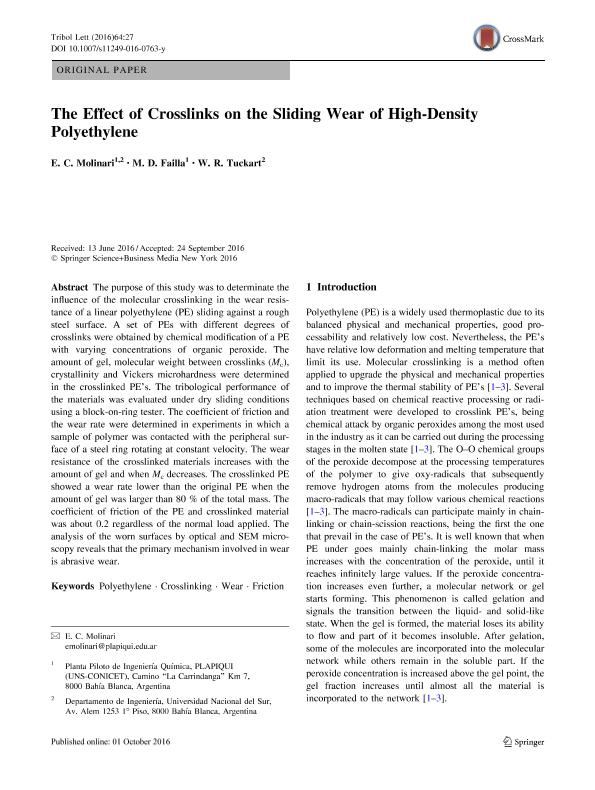Mostrar el registro sencillo del ítem
dc.contributor.author
Molinari, Erica Cintia

dc.contributor.author
Failla, Marcelo Daniel

dc.contributor.author
Tuckart, Walter Roberto

dc.date.available
2018-03-26T18:16:34Z
dc.date.issued
2016-11
dc.identifier.citation
Molinari, Erica Cintia; Failla, Marcelo Daniel; Tuckart, Walter Roberto; The Effect of Crosslinks on the Sliding Wear of High-Density Polyethylene; Springer/Plenum Publishers; Tribology Letters; 64; 2; 11-2016; 27-39
dc.identifier.issn
1023-8883
dc.identifier.uri
http://hdl.handle.net/11336/39940
dc.description.abstract
The purpose of this study was to determinate the influence of the molecular crosslinking in the wear resistance of a linear polyethylene (PE) sliding against a rough steel surface. A set of PEs with different degrees of crosslinks were obtained by chemical modification of a PE with varying concentrations of organic peroxide. The amount of gel, molecular weight between crosslinks (Mc), crystallinity and Vickers microhardness were determined in the crosslinked PE’s. The tribological performance of the materials was evaluated under dry sliding conditions using a block-on-ring tester. The coefficient of friction and the wear rate were determined in experiments in which a sample of polymer was contacted with the peripheral surface of a steel ring rotating at constant velocity. The wear resistance of the crosslinked materials increases with the amount of gel and when Mc decreases. The crosslinked PE showed a wear rate lower than the original PE when the amount of gel was larger than 80 % of the total mass. The coefficient of friction of the PE and crosslinked material was about 0.2 regardless of the normal load applied. The analysis of the worn surfaces by optical and SEM microscopy reveals that the primary mechanism involved in wear is abrasive wear.
dc.format
application/pdf
dc.language.iso
eng
dc.publisher
Springer/Plenum Publishers

dc.rights
info:eu-repo/semantics/openAccess
dc.rights.uri
https://creativecommons.org/licenses/by-nc-sa/2.5/ar/
dc.subject
Crosslinking
dc.subject
Friction
dc.subject
Polyethylene
dc.subject
Wear
dc.subject.classification
Físico-Química, Ciencia de los Polímeros, Electroquímica

dc.subject.classification
Ciencias Químicas

dc.subject.classification
CIENCIAS NATURALES Y EXACTAS

dc.title
The Effect of Crosslinks on the Sliding Wear of High-Density Polyethylene
dc.type
info:eu-repo/semantics/article
dc.type
info:ar-repo/semantics/artículo
dc.type
info:eu-repo/semantics/publishedVersion
dc.date.updated
2018-03-26T17:43:54Z
dc.journal.volume
64
dc.journal.number
2
dc.journal.pagination
27-39
dc.journal.pais
Estados Unidos

dc.journal.ciudad
New York
dc.description.fil
Fil: Molinari, Erica Cintia. Consejo Nacional de Investigaciones Científicas y Técnicas. Centro Científico Tecnológico Conicet - Bahía Blanca. Planta Piloto de Ingeniería Química. Universidad Nacional del Sur. Planta Piloto de Ingeniería Química; Argentina. Universidad Nacional del Sur. Departamento de Ingeniería; Argentina
dc.description.fil
Fil: Failla, Marcelo Daniel. Consejo Nacional de Investigaciones Científicas y Técnicas. Centro Científico Tecnológico Conicet - Bahía Blanca. Planta Piloto de Ingeniería Química. Universidad Nacional del Sur. Planta Piloto de Ingeniería Química; Argentina
dc.description.fil
Fil: Tuckart, Walter Roberto. Consejo Nacional de Investigaciones Científicas y Técnicas; Argentina. Universidad Nacional del Sur. Departamento de Ingeniería; Argentina
dc.journal.title
Tribology Letters

dc.relation.alternativeid
info:eu-repo/semantics/altIdentifier/url/https://link.springer.com/article/10.1007%2Fs11249-016-0763-y
dc.relation.alternativeid
info:eu-repo/semantics/altIdentifier/doi/http://dx.doi.org/10.1007/s11249-016-0763-y
Archivos asociados
